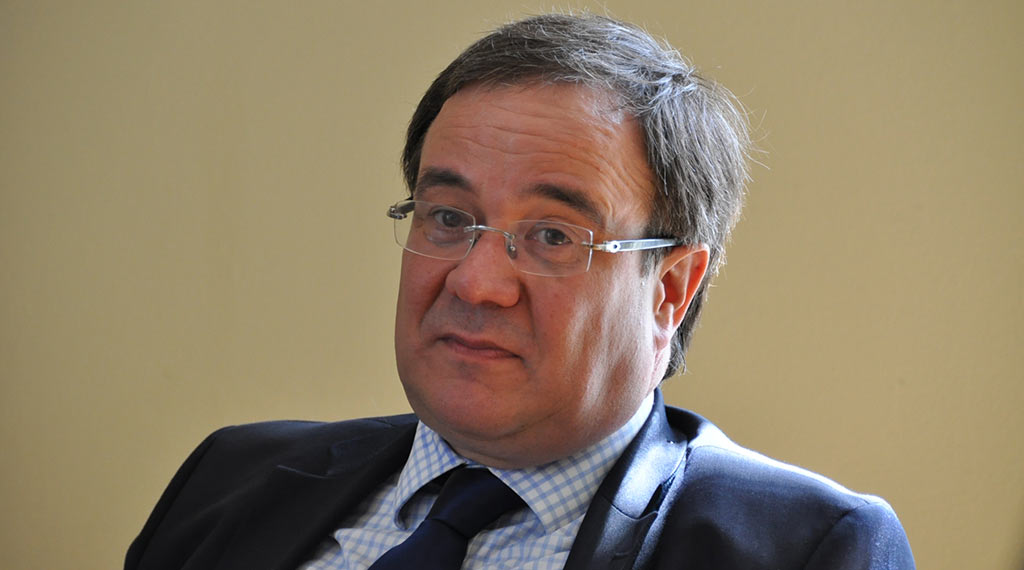Merkel’s successor would likely lead Germany down path of appeasement with China

German politician Armin Laschet replaced Angela Merkel as leader of the center-right Christian Democrat Union (CDU) party earlier this year. He is expected to become the next Chancellor of Germany as the CDU is likely to be the top party again when federal elections are held in September.
Laschet has argued against confronting China as an adversary, saying it would be counterproductive. Instead, his government would look to partner with Beijing on issues such as climate change.
“The question is — if we’re talking about ‘restraining’ China, will that lead to a new conflict? Do we need a new adversary?” Laschet said in an interview with the Financial Times, adding: “And there the European response was cautious, because, yes, China is a competitor and a systemic rival, it has a different model of society, but it’s also a partner, particularly in things like fighting climate change.”
“The 21st century is very different and the prism of how the world looked before 1989 offers limited advice,” he explained, adding: “We have a multipolar world [now] with different actors.”
Laschet went on to say that while Germany should not refrain from addressing “critical issues,” he expressed doubt over the effectiveness of challenging authoritarian regimes, such as China, on their human rights records.
“I’m not sure that always speaking out, loudly and aggressively, in public about a country’s human rights situation really leads to improvements on the ground,” Laschet said.
“Often you can reach more in the area of human rights by addressing issues in private conversations with leaders of other countries than by talking about it in press conferences,” he added.
Yet the CDU leader claimed that this would not mean that he would take a soft approach on China if elected, saying: “I would try to foster our partnership wherever possible, and, at the same time, make clear what we expect from China: that it accept reciprocity, embrace multilateralism and respect human rights.”
Laschet has long been seen as a pro-China politician in Germany, through backing more economic integration with the communist regime in areas such as trade and technology.
Last year, he came out in opposition to a ban on Chinese telecom giant Huawei from the nation’s 5G network, despite security concerns expressed by the Trump administration.
“The consequence of a rejection would be that the entry into this technology would be delayed, which cannot be the goal… As an export-oriented country, we have a great interest in free trade. Germany as an industrial location thrives on international exports, including to China,” he said.
During Chancellor Angela Merkel’s tenure in office, Germany has seen increasing ties with the communist regime, with China becoming the country’s top trading partner in 2018.
Merkel has also been a leading force in trying to push through a massive trade deal between the European Union and China, which has stalled after a series of reciprocal sanctions between the EU and Beijing.
German companies, including Volkswagen and BMW, have been accused of profiting from the use of slave labor in the Xinjiang region, where millions of Uighurs have been reportedly interned in concentration camps.
Meanwhile, the Free Democratic Party (FDP), another center-right party with a free market focus which currently places third in opinion polls, has positioned itself as an emphatic defender of Taiwan’s rights. In its election platform, the FDP affirmed Taiwan’s democracy and freedom, saying it offers an alternative to China’s dictatorship. The party’s stance includes support for Taiwan’s inclusion in international organizations that do not require statehood for participation and recommends that Germany and the EU expand their engagement with Taiwan.
It also condemns China’s military intimidation of Taiwan and spells out a plan to work with Germany’s European allies and other democracies, such as the “Quad” countries of Australia, Japan, India and the U.S., to devise strategies to counter Chinese aggression.
Even the center-left Green Party has tacked more hawkish recently on the China issue, saying it is committed to a policy of “dialogue and toughness.” Green candidate for chancellor Annalena Baerbock has acknowledged that China is too big to cut off, but that “we can say: products from forced labor do not come onto our market.”
Baerbock has been consistent in her hawkish approach to adversarial powers, saying it is important to “increase the pressure on Russia” after its recent military movements near the border with Ukraine. The Green Party’s manifesto also demands that political support for the German-Russian Nord Stream II energy pipeline should be withdrawn.
Laschet has also been consistent. He supports the controversial Nord Stream II pipeline and quipped that with Russia “you have to talk more, not less.”
Armin Laschet by Christliches Medienmagazin pro is licensed under CC BY-SA 2.0
- Nearly half say coronavirus is man-made; 29% say it was intentionally released - February 17, 2022
- Americans back total boycott of Beijing Olympics under certain conditions - December 13, 2021
- Beijing pushes limits of authoritarian reach with latest celebrity “disappearance” - November 19, 2021
